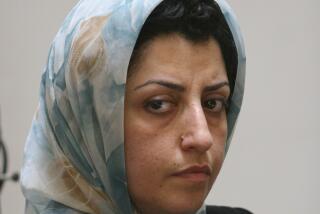Mohammad Khatami to run in Iran’s presidential election
- Share via
TEHRAN — Iran’s former president, Mohammad Khatami, a moderate, announced Sunday that he would run against incumbent Mahmoud Ahmadinejad in a critical election in June that is shaping up as a referendum on the performance of the current conservative government.
After months of whispers about a possible run, Khatami’s move is sure to bolster turnout in a contest that most analysts see as coming at a crucial juncture for the Islamic Republic and its relations with the outside world.
“I strongly announce my candidacy in the election,” the cleric, 65, told reporters at the launch of a website for his political group, the Combatant Clergy Assn. “I had no hesitation from the very beginning,”
Iran’s political system combines elements of a theocracy and democratic republic. The country holds regular elections for parliament and the presidency, but all candidates are vetted for loyalty by a powerful committee of jurists and clerics, and ultimate power over military and security matters rests with a cleric, Iran’s supreme leader, Ayatollah Ali Khamenei.
But it is the president who appoints ministers of interior, intelligence and foreign affairs and can heavily influence Iran’s domestic and international policies.
Ahmadinejad’s anti-Israeli rhetoric has made him toxic to the West. The Obama administration has indicated that it is willing to hold discussions with Iran, on issues that include suspicions about the nation’s nuclear program. But the administration might prefer to negotiate with a less polarizing figure after the Jun. 12 elections.
Khatami’s calls for a “Dialogue Among Civilizations” and attempts to normalize Tehran’s relations with the West have won accolades abroad. He was twice elected president on platforms of increased social freedoms and moderate policies that attracted young and female voters. He was constitutionally barred from seeking a third consecutive term.
Economic stagnation and political infighting overshadowed his presidency, which lasted from 1997 to 2005. Critics also viewed Khatami as either too weak or beholden to the political status quo to bring about meaningful change.
Still, on bread-and-butter issues Iran has fared even worse under his successor, Ahmadinejad, despite record international oil prices through much of his tenure. Unemployment and inflation are worse now than under Khatami.
“If it’s a totally free and fair election, Khatami stands a very good chance,” said Karim Sadjadpour, Iran analyst at the Carnegie Endowment for International Peace. “When Iranian voters go to the polls, economics is on their mind,” he said.
Many Khatami supporters became disillusioned after he failed to make good on his promises for concrete change and buckled under pressure from religious hard-liners, who held up his proposals in legal limbo and used courts to jail his most effective allies.
Khatami on Sunday downplayed his candidacy. Instead of making an inspirational speech or announcing new political initiatives, he said he thought his candidacy would encourage voters to participate in the election, regardless of who wins.
“I hope my presence and the presence of others can contribute to high turnout and the result, whatever it is, will be a blessing,” he said.
Other than his own political weaknesses, Khatami faces several possible stumbling blocks in his path to regain the presidency. The Council of Guardians must approve his candidacy. In 2004 parliamentary elections, the council barred dozens of reformist candidates who had run successfully for office four years earlier.
Khatami also faces the prospect of competing against another reformist candidate, Mehdi Karroubi, a former speaker of parliament who has also entered the race. Khatami and Karroubi could split the moderate vote, though most analysts say that the two probably will join forces.
Khatami and his supporters have expressed concern that electoral shenanigans could stack the deck against him. The Interior Ministry, which oversees elections, is firmly under the control of Ahmadinejad, whose supporters in 2005 rallied military officials and hard-line militiamen to vote en masse in what was criticized by some as a misuse of official power.
Persuading supporters to turn out for the vote will also be a major challenge. In 1997 and 2001, Khatami’s calls for dramatic change brought more highly educated urban voters out in droves.
“The dynamic is that the Tehran voters aren’t going to the polls and the voters in the provinces are voting in much higher numbers,” Sadjadpour said. “Those voters Ahmadinejad considers his constituency.”
--
Mostaghim is a special correspondent
More to Read
Sign up for Essential California
The most important California stories and recommendations in your inbox every morning.
You may occasionally receive promotional content from the Los Angeles Times.












